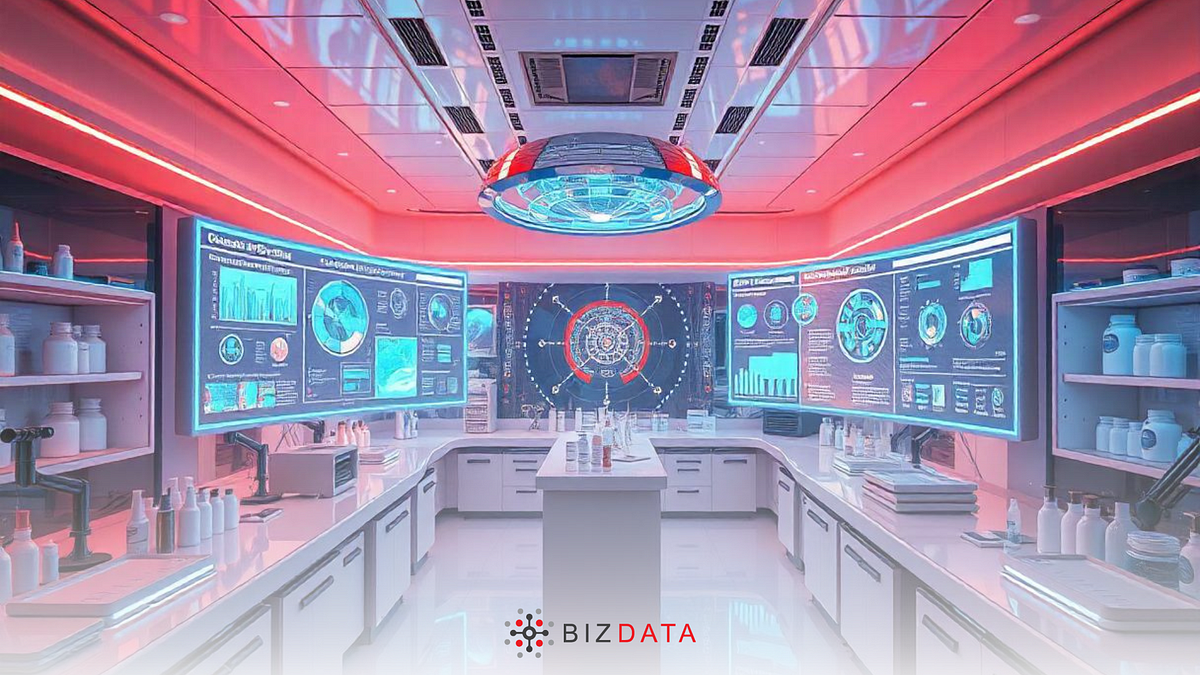The global cosmetics industry is one of constant reinvention, driven by consumers’ ever-changing demands for new, innovative products. However, turning creative ideas into market-ready cosmetics is a complex, multi-step process laden with challenges. The road from ideation to commercialization involves everything from rigorous R&D to regulatory approvals, which can stall or even derail projects. Enter Goldfinch AI Agent — an intelligent solution aimed at streamlining the innovation process, helping cosmetic companies navigate these challenges more efficiently.
The journey of taking a product from concept to market in the cosmetics industry involves a delicate balance of science, creativity, regulation, and consumer trends. Each stage of product development presents unique challenges:
1. Product Development and Formulation: Creating cosmetics that meet consumer expectations for safety, sustainability, and effectiveness requires a great deal of research and testing. Formulation challenges are exacerbated by increasing consumer demand for eco-friendly products, requiring companies to develop formulations that are both effective and sustainable.
Challenge: A McKinsey report highlights that over 40% of new product launches in the beauty industry fail due to either formulation issues or failure to meet customer expectations. Major brands struggle with balancing efficacy and consumer demand for natural, cruelty-free ingredients.
Real Case: In 2015, Johnson & Johnson faced backlash over their baby powder containing talc, which led to lawsuits regarding its safety. The company has since pivoted to using cornstarch in the U.S. and Canada due to rising demand for safer, more natural ingredients. This case highlights the importance of rigorous product development and formulation processes.
2. Regulatory Compliance: Regulatory landscapes vary globally, making it increasingly difficult for companies to keep up with the constantly evolving rules. For example, the European Union has banned over 1,300 ingredients in cosmetics, whereas the United States has banned fewer than 30. Navigating these differences is a major obstacle for international beauty brands.
Challenge: Compliance with different countries’ regulations is critical but costly. The beauty industry spends an estimated $5.4 billion annually on regulatory compliance across different regions.
Real Case: In 2019, cosmetics giant Estée Lauder paid $1.1 million in fines for failing to comply with Canada’s ingredient safety regulations. Estée Lauder had to recall products due to the presence of banned ingredients, underscoring the challenges global companies face in navigating the complex regulatory environment.
3. Sustainability Pressure: The cosmetics industry has been facing growing scrutiny regarding the sustainability of its products and processes. Consumers increasingly demand sustainable packaging, ethically sourced ingredients, and cruelty-free products.
Challenge: According to a 2020 survey by Nielsen, 73% of global consumers say they are willing to change their consumption habits to reduce environmental impact. As a result, brands are under immense pressure to innovate sustainably.
Real Case: L’Oréal set ambitious goals in 2019 under its “L’Oréal for the Future” program, aiming for 100% eco-friendly packaging by 2030. However, this comes with significant R&D costs, supply chain challenges, and the risk of alienating consumers if prices increase as a result of the sustainability shift.
4. Supply Chain Disruptions: The global cosmetics supply chain is prone to disruptions due to the sourcing of rare ingredients and geopolitical issues. This became particularly apparent during the COVID-19 pandemic, which exposed vulnerabilities in the global supply chain for ingredients used in cosmetics.
Challenge: Raw materials for cosmetics — like shea butter from Africa or argan oil from Morocco — are highly susceptible to price fluctuations and supply shortages. A report by Grand View Research in 2022 showed that ingredient shortages were cited as the primary cause of 32% of new product delays in the beauty industry.
Real Case: In 2020, beauty brand Beiersdorf (owner of Nivea) experienced severe delays in launching new products due to global supply chain disruptions caused by the pandemic. The company had to delay or revise its product lines, leading to lost revenue and damaged brand reputation.

In light of the significant challenges faced by the cosmetics industry — ranging from formulation complexities to regulatory compliance and sustainability demands — Goldfinch AI Agent offers a comprehensive solution that addresses each hurdle in the innovation process. By harnessing the power of AI, cosmetic companies can streamline operations, reduce costs, and accelerate their product development timelines, ensuring a more effective pathway to commercialization.
1. Enhanced Ideation and Trend Forecasting: The Goldfinch AI Agent leverages real-time market data, consumer feedback, and competitive analysis to help brands identify emerging trends early. This proactive approach enables companies to anticipate shifts in consumer preferences and prioritize the development of products that are more likely to succeed. By automating the trend identification process, Goldfinch allows companies to focus on high-impact ideas, minimizing the risk of launching irrelevant or outdated products.
How It Overcomes Challenges:
The cosmetics industry is under pressure to deliver innovative, personalized products. Goldfinch AI Agent helps by providing insight into consumer needs and global market shifts, allowing companies to innovate based on real-time data rather than guesswork. This dramatically reduces the failure rate of new product launches caused by misaligned formulations or irrelevant concepts.
2. Efficient Formulation Management: Formulating cosmetics that meet consumer demands for efficacy, safety, and sustainability is no small feat. Goldfinch AI Agent assists in optimizing formulations by analyzing ingredient properties, ensuring compliance with international regulations, and automating the R&D process. This helps reduce the time and costs associated with trial-and-error approaches in product development.
How It Overcomes Challenges:
Goldfinch can mitigate the common challenges related to formulation by offering predictive models that test ingredient combinations virtually before actual production begins. This ensures products meet safety standards, efficacy expectations, and sustainability requirements without the costly setbacks often encountered in physical testing and re-development. It also accelerates the timeline by automating ingredient testing and regulatory checks in real-time.
3. Automated Regulatory Compliance: Regulatory hurdles are a significant barrier in the cosmetic industry, especially for companies operating on a global scale. Goldfinch AI Agent ensures compliance by constantly updating its database with global regulatory changes. Whether it’s EU regulations on banned ingredients or specific labelling requirements for the U.S. market, Goldfinch AI continuously monitors and checks for compliance across all stages of product development.
How It Overcomes Challenges:
By automating the compliance process, Goldfinch reduces the risk of costly delays, recalls, and fines due to non-compliance. It tracks ingredient lists, packaging materials, and marketing claims to ensure everything is in line with regional regulations. This helps companies navigate complex regulatory landscapes seamlessly, cutting down on the $5.4 billion the industry spends annually on compliance efforts.
4. Sustainability and Supply Chain Optimization: With rising consumer demand for sustainable beauty products, the cosmetics industry is under increasing pressure to incorporate eco-friendly practices into product development and packaging. Goldfinch AI Agent helps companies prioritize sustainability by optimizing ingredient sourcing, reducing waste, and suggesting eco-friendly packaging options. It also analyzes supply chain data to identify areas for improvement, ensuring that products are developed and delivered with minimal environmental impact.
How It Overcomes Challenges:
Goldfinch AI Agent helps brands adhere to their sustainability goals by offering data-driven insights into sustainable ingredient alternatives and packaging options. By automating these recommendations, companies can reduce their environmental footprint without sacrificing quality or performance. Moreover, Goldfinch streamlines the supply chain by providing real-time data on ingredient availability and pricing, reducing the risk of delays caused by shortages or inefficiencies.
5. Streamlined Project Management: Managing multiple innovation projects simultaneously can create bottlenecks, especially when dealing with complex tasks like formulation, testing, and regulatory submissions. Goldfinch AI Agent provides a centralized platform for tracking project milestones, ensuring teams have up-to-date information on formulation progress, packaging design, and regulatory approvals. This real-time visibility allows for better coordination between teams, faster decision-making, and a more efficient product development cycle.
How It Overcomes Challenges:
By providing an integrated project management system, Goldfinch AI Agent minimizes delays and ensures that all stakeholders are aligned. Teams can collaborate more efficiently, track progress in real-time, and address bottlenecks before they cause major setbacks. This reduces the overall time-to-market for new products, ensuring brands stay competitive in a fast-paced industry where timing is critical.
6. Cost-Benefit Evaluation: Allocating resources efficiently is crucial in an industry where margins are tight, and the cost of failed product launches is high. Goldfinch AI Agent evaluates each innovation project based on its potential market impact, development costs, and expected ROI. This ensures that companies focus their resources on high-potential products, reducing the risk of investing in innovations that are unlikely to succeed.
How It Overcomes Challenges:
Through advanced cost-benefit analysis, Goldfinch AI Agent helps companies make data-driven decisions about which projects to prioritize. By focusing on products with the highest likelihood of success, companies can optimize their R&D budgets and minimize losses from unsuccessful launches. This ultimately improves profitability and helps companies maintain a competitive edge in a crowded market.

In an industry where time-to-market, compliance, and innovation are crucial, cosmetic companies must adopt advanced technologies to stay competitive. Goldfinch AI Agent provides an all-encompassing solution that enhances ideation, streamlines product development, automates regulatory compliance, and optimizes project management.
The use of AI in cosmetic innovation is not just a passing trend; it is the future of the industry. Companies that embrace AI tools like Goldfinch will not only improve their operational efficiency but also strengthen their market positioning. By driving better decision-making, automating tedious processes, and aligning innovation with consumer preferences, Goldfinch AI Agent is helping shape the next generation of cosmetic products — ensuring that companies not only meet but exceed consumer expectations in a rapidly evolving market.
With AI-powered platforms like Goldfinch, the cosmetics industry stands on the brink of a new era of innovation — one where creativity, technology, and strategy converge to deliver unprecedented results.
Download the Whitepaper to learn more and Start Your Free Trial today!
